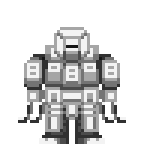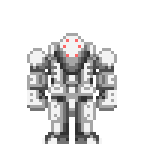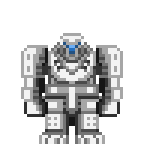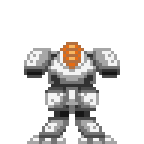Difference between revisions of "User:Kyres1/Sandbox"
(Created page with "= Exosuits = Construction of exosuits are restricted by ID, so they are typically the product of roboticists and the Research Director. These can be tremendously helpf...") |
(adding mechs....) |
||
| Line 55: | Line 55: | ||
<div class="mw-collapsible-content"> | <div class="mw-collapsible-content"> | ||
[[File:ModularAPLU.png]] | [[File:ModularAPLU.png]]'''Powerloader''' - Parts for an industrial-grade power loader. The modular mecha adaptation of the APLU "Ripley," tends to be utilized for mining and heavy lifting. | ||
* Has decent armor across the board. | |||
* Has an open chassis, not protected against the environment. | |||
* Powerful, heavy manipulators with substantial damage per swing. | |||
* Slow and bulky but hard to damage motivators. | |||
[[File:ModularLight.png]]'''Light Chassis''' - Parts for a light, maneuverable and fragile mech. The modular mecha adaptation of the Odysseus, tends to be utilized for medical response and scouting. | |||
* Has terrible armor, generally. | |||
* Has a sealed chassis, protected from the environment. | |||
* Light, nigh harmless manipulators that are unable to damage windows or doors. | |||
* Fast and agile motivators basically made of glass. | |||
[[File:ModularHeavy.png]]'''Heavy Chassis''' - Parts for an absurdly large, heavy-duty mech. The modular mecha adaptation of the Durand, tends to be utilized for really big problem solving. | |||
* Has phenomenal armor, generally. | |||
* Has a sealed chassis, protected from the environment. | |||
* Extremely heavy and equally slow motivators. | |||
* The heaviest duty manipulators available, presumably carries the impact of a train. | |||
[[File:ModularCombat.png]]'''Combat Chassis''' - Parts for a well-balanced combat mech. The modular mecha adaptation of the Gygax, tends to be utilized for dynamic combat situations. | |||
* Has relatively good armor. | |||
* Has a sealed chassis, protected from the environment. | |||
* Moderately armored motivators, still quite fast. | |||
* Quick, but light manipulators that don't have much force behind them. | |||
</div></div> | </div></div> | ||
Revision as of 17:40, 2 January 2020
Exosuits
Construction of exosuits are restricted by ID, so they are typically the product of roboticists and the Research Director. These can be tremendously helpful or tremendously annoying depending on who uses it. They take more work to make than robots and require special circuits, which are obtained through the Quartermaster or the Research and Development console.
Exosuits are wholly modular, meaning what you make can (mostly) be mixed and matched to create whatever vehicle you desire. From chicken-legged brawling mecha to tread-based taxis, the possibilities are endless.
The current list of exosuit parts is as follows.
Exosuit Construction
 The Frame
The Frame
The backbone of the mech itself, this can be modified at any stage of construction.
To finish:
- Apply 15 steel sheets to the frame.
- Wrench the steel sheets in place.
- Weld the steel sheets in place.
- Wire the frame.
- Wire cutters to neaten the wiring.
- The following is the limitation and requirement for the frame's finished parts :
- - Motivators
- - Sensors
- - Manipulators
- - Chassis
- Once it's all applied, screwdriver to complete.
 The Parts
The Parts
The actual defining features of the mech, appearance and performance wise. Each part has unique attributes that make them superior or inferior to the other parts, depending on situation.
Individual parts of the mech require various, smaller parts from the mech fabricator to finish. Robot parts are found under the "robot" tab specifically, not the exosuit tab itself.
To finish the motivators and manipulators:
- Apply one robot actuator.
To finish the sensors:
- Apply one robot camera.
- Apply one robot radio.
- Apply one exosuit control module, this is among the most important parts of the mech. Details are in "The Details" section below.
To finish the chassis:
- Apply the exosuit armor of your choice. This is very important as it judges the durability of your mech.
- Apply one power cell of your choice.
- Apply one robot diagnostic unit.
- Once it's all done, place the parts on the mech frame.
 The Details
The Details
The specifics on each frame available to robotics.
 Powerloader - Parts for an industrial-grade power loader. The modular mecha adaptation of the APLU "Ripley," tends to be utilized for mining and heavy lifting.
Powerloader - Parts for an industrial-grade power loader. The modular mecha adaptation of the APLU "Ripley," tends to be utilized for mining and heavy lifting.
- Has decent armor across the board.
- Has an open chassis, not protected against the environment.
- Powerful, heavy manipulators with substantial damage per swing.
- Slow and bulky but hard to damage motivators.
 Light Chassis - Parts for a light, maneuverable and fragile mech. The modular mecha adaptation of the Odysseus, tends to be utilized for medical response and scouting.
Light Chassis - Parts for a light, maneuverable and fragile mech. The modular mecha adaptation of the Odysseus, tends to be utilized for medical response and scouting.
- Has terrible armor, generally.
- Has a sealed chassis, protected from the environment.
- Light, nigh harmless manipulators that are unable to damage windows or doors.
- Fast and agile motivators basically made of glass.
 Heavy Chassis - Parts for an absurdly large, heavy-duty mech. The modular mecha adaptation of the Durand, tends to be utilized for really big problem solving.
Heavy Chassis - Parts for an absurdly large, heavy-duty mech. The modular mecha adaptation of the Durand, tends to be utilized for really big problem solving.
- Has phenomenal armor, generally.
- Has a sealed chassis, protected from the environment.
- Extremely heavy and equally slow motivators.
- The heaviest duty manipulators available, presumably carries the impact of a train.
 Combat Chassis - Parts for a well-balanced combat mech. The modular mecha adaptation of the Gygax, tends to be utilized for dynamic combat situations.
Combat Chassis - Parts for a well-balanced combat mech. The modular mecha adaptation of the Gygax, tends to be utilized for dynamic combat situations.
- Has relatively good armor.
- Has a sealed chassis, protected from the environment.
- Moderately armored motivators, still quite fast.
- Quick, but light manipulators that don't have much force behind them.